Idles: “Most of what you hear is the first or the second take. We always keep mistakes in”
The UK punks talk keeping their "urgent, automatic" guitar playing honest and weaponising joy
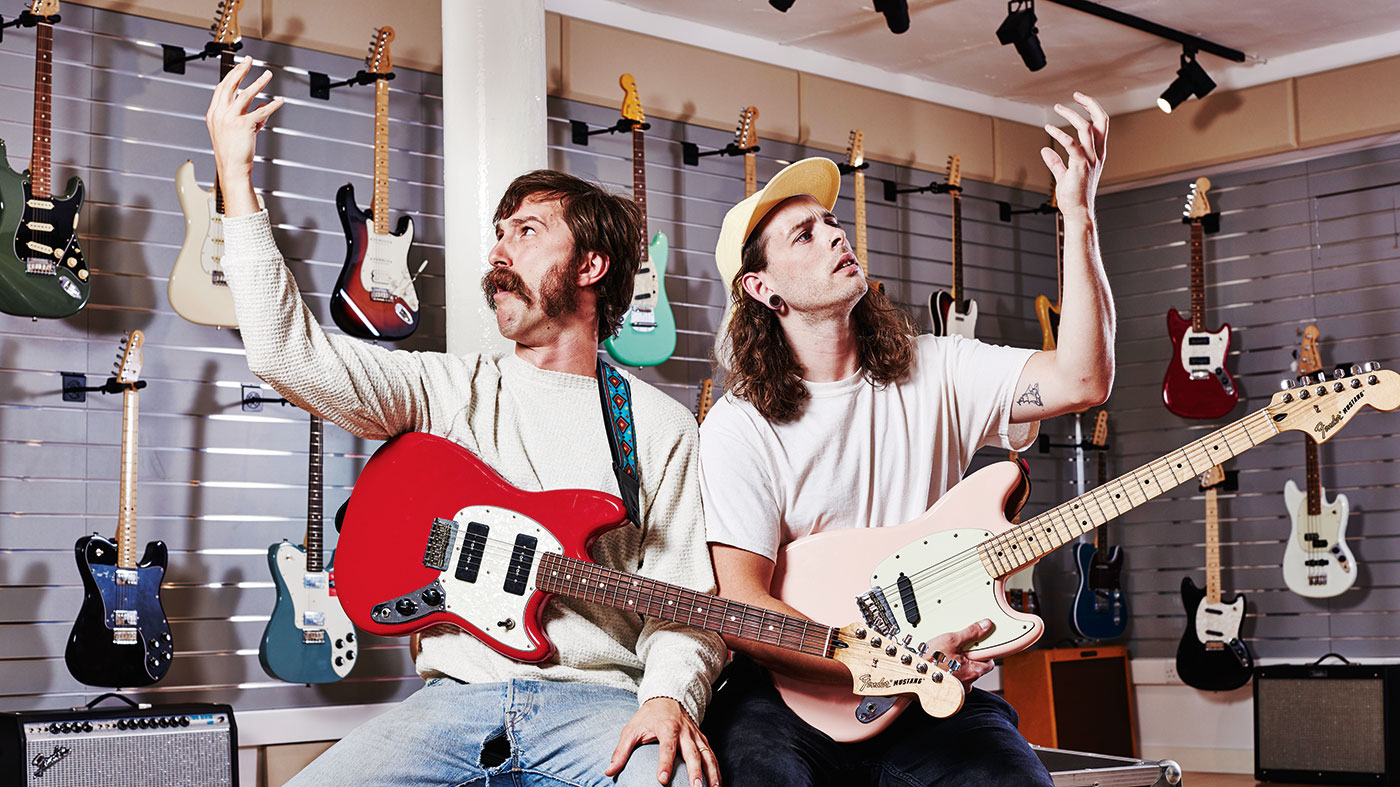
Now that everybody in the world is angry, it would be an ironic twist indeed if joy proved itself the more subversive and effective emotion to recruit in service to furious music.
At least, that’s how Bristol-based post-punk quintet Idles see it. After their strident 2017 debut, Brutalism, Idles have earned a reputation for trafficking in combustible angst, but they share a belief that reshaping anger via the weaponising of joy might just help us exorcise the demons that are pulling society apart.
Idles share a belief that the weaponising of joy might just help us exorcise the demons that are pulling society apart
The title of their sophomore album, Joy As An Act Of Resistance, articulates this mood succinctly. Idles are looking past the anger and invite you to do likewise. A colourful spectrum of Candy Apple Reds and Surf Greens at Fender’s London HQ offers a playfully incongruous backdrop for guitarists Lee Kiernan and Mark Bowen to discuss a propulsive sound rooted in grey and brutal real-world struggles. These struggles, brought to life through vocalist Joe Talbot’s unsparing lyrics, tell of a country on its knees, reeling amid a supernova of resentment. So where does the joy fit in?
“People always get us confused when we use the word ‘anger’,” says Bowen. “There is definitely an element to what we do that is anger, but it’s more about violence. Our language, and our mode of expressing any kind of emotions with each other, or sentiments that we might have, our language lies in violence and anything that we are deft in expressing is through some sort of violence. That’s where we feel the most catharsis from.
“I think that the violent element is still in there but, from the outset, we noticed that we were writing a more positive thing because we were feeling more positive, and we wanted to use more positive chord structures, major chord sequences, just to convey the same kind of violence but in a happy, joyous mode.”
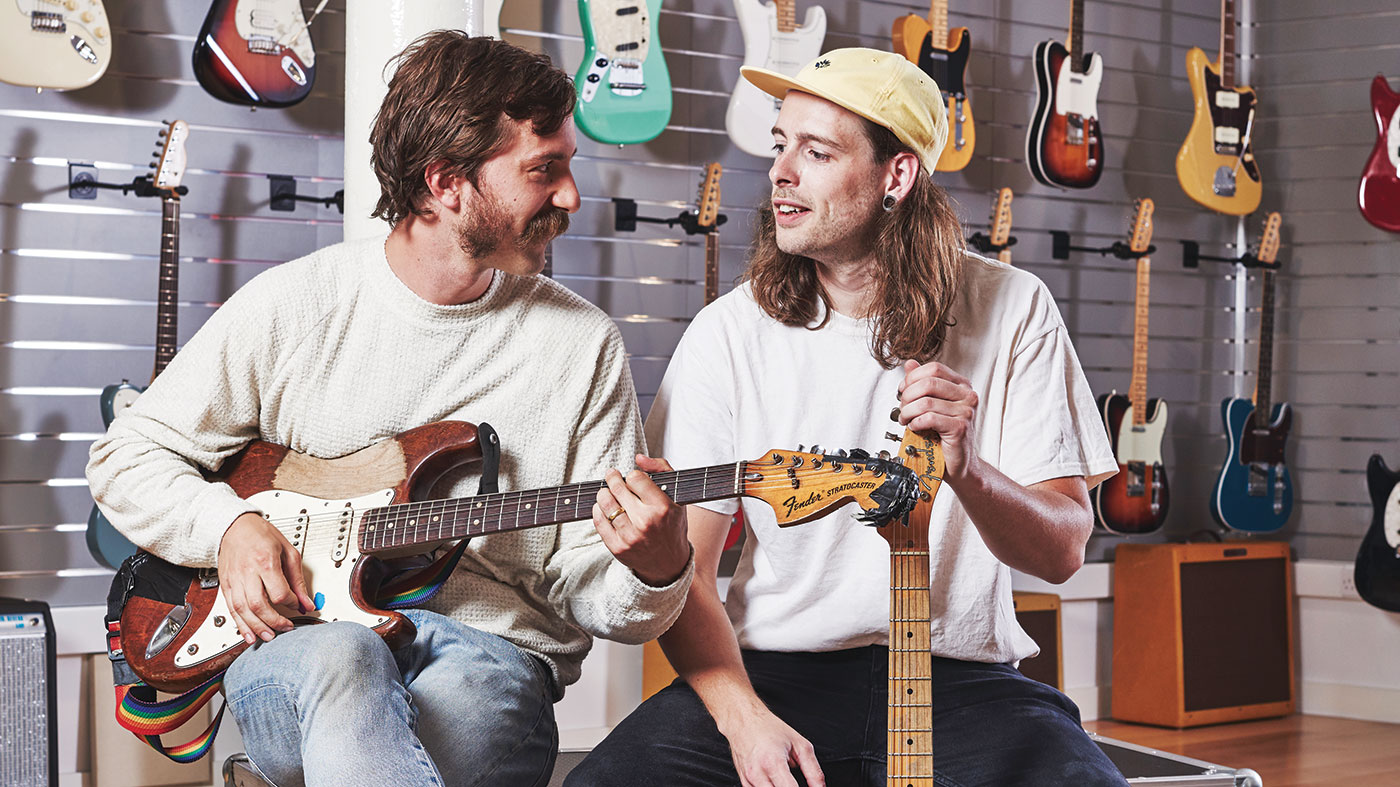
Nihilism be damned
Those familiar with Idles will immediately recognise the violence Bowen speaks of. They will recognise it in the percussive tick-tock of Colossus, which opens Joy... with an anxious fuse. They will recognise it in the language of Never Fight A Man With A Perm, in the succinct kitchen-sink nihilism of I’m Scum, and the violent grief of June, a song about the death of Talbot’s daughter.
It’s also very difficult to stop that initial anger burst
They might not see the joy, not at first. But it’s there, all right. It’s there on Danny Nedelko, an anarchic celebration of immigrants as our friends, colleagues, and neighbours. It’s there on the sweeping punk riot of Gram Rock, and in Talbot’s arch lyrics, like when he’s surely quoting Toy Story’s Woody on Rottweiler - ‘There’s a snake in my boots’ - or on the dystopian, greetings-card romance of Love Song.
Get the MusicRadar Newsletter
Want all the hottest music and gear news, reviews, deals, features and more, direct to your inbox? Sign up here.
When the joy does show up, it serves a grander purpose, softening the dogmatic hard edges of Idles’ political invective. Idles have the courage of their convictions but recognise that you can’t dissuade someone of their beliefs by declaring they’re wrong.
“It’s also very difficult to stop that initial anger burst,” says Kiernan. “Every day I’m fed the news, I’m fed this new bit of bullshit. And this is the point: that’s your natural reaction, and a lot of us do feel that way every time there is a new bit of shit news that comes out. You get angry instantly, and that’s the whole point of this album, to not do that. It’s not to just go straight to that first reaction, ’cos that’s the easiest option every time, to just get angry and shout at people.”
Automatic for the people
Embracing the paradox is all part of Idles’ ethos. On Joy... they put a smiling face on rage. They confront machoism and espouse the right for males to show vulnerability, and yet set it to confrontational arrangements with Talbot straining at the mic. They might urge caution before forming an opinion, but not when it comes to writing and recording, when caution becomes the enemy. They write better to a concept and yet strive to keep it as improvisational as possible.
I now deliberately play less because I know I like to dance onstage
“It has to be urgent and automatic,” says Bowen. “We try to be as automatic as possible, which, again, is contrived - talk about dichotomies and paradoxes!” As for guitar heroes? Bowen thinks it’s too rock ’n’ roll. And yet they’ll readily cite Dick Dale, Brian May, and James Hetfield.
“Tolstoy is my guitar hero!” says Bowen. “I fucking worship certain guitar players because you have to recognise there are people who do it so much fucking better than me. I cannot listen to enough Dick Dale.”
You can hear the Dick Dale in some of Kiernan and Bowen’s more skronky, antic arrangements, but Joy... sees them use their guitars more economically.
“I now deliberately play less because I know I like to dance onstage,” laughs Bowen. There’s nothing explicitly hip-hop about Idles, save for the preeminence of Talbot’s vocals, but it informs Kiernan’s playing in much the same way as Gang Of Four did on Brutalism.
“There is a big influence of Wu-Tang on this album, in many respects - the single-chord stabs and placements,” he says. Anything goes, so long as it’s honest. It’s preserved in how they communicate and how they record.

Three takes and out
After tracking Brutalism in London, being spread out and commuting to and from the studio, Idles chose Monnow Valley Studio this time around. A residential facility with a huge drum room, they could record all night if they wanted to, but this isn’t Rush or Yes; this is Idles, and you only get three takes.
“It captures a sense of urgency,” says Bowen. “It doesn’t allow for any kind of navel gazing. A really important thing in our music is the naivety. Most of what you hear on that album is the first or the second take. We always keep mistakes in. We preach in interviews and our whole ethos is about being as honest as possible and that’s the most important tool for us, and probably the best thing that we are at. Doing those three takes is the most honest way of going about things, allowing the mistakes to be included in there is the most honest way because...”
“...Because we’re not that good,” says Kiernan, finishing the sentence. “It’s as simple as that.”
You ain’t no punk, you punk
But, more importantly, if Idles’ sound is to work, it can’t be over-worked. Were it to lose its danger, or be cleaned up, it would die. The beauty of Idles lies in their disfigured and fractured arrangements, the chaos, the instinctive bursts of melody that complement Talbot’s noir humour.
They’ve been called the UK’s best punk band and they’re not even really punk; it’s as though punk’s fidgety id has broken loose, free of history, to create itself anew. For Bowen’s money, disco was more punk than punk, and who could argue that Nile Rogers isn’t cooler than Sid Vicious?
You don’t always have to play perfectly. You can go out there, do something you love, with all your energy, and have a laugh
“Even before that, you look at Chuck Berry and rock ’n’ roll, people like Dick Dale and Link Wray, that’s punk, too,” adds Bowen, “even though it doesn’t feel that way because it was a much, much more conservative time.”
Even now, not everyone is going to get it. They might not care for the politics. Fine. They might hate the music. That’s fine, too. In their short career Idles have supported the Foo Fighters, the Maccabees, the Dead Kennedys, Future Islands... to varying degrees of success.
“They push you harder when they are being so negative,” says Kiernan. “At first you feel like you’ve been kicked. But then your brain just goes, ‘Fuck it!’”
That’s all part of the fun. Offending people in real time is all in a day’s work. Therein, again, lies the joy.
“That’s one of the nice things about our band,” says Kiernan. “Some gigs, we play so fucking badly and it’s not that often any more, but sometimes it’s pretty bad. We get forgiven for actually having fun. You don’t always have to play perfectly. You can go out there, do something you love, with all your energy, and have a laugh.”
Pedal-powered
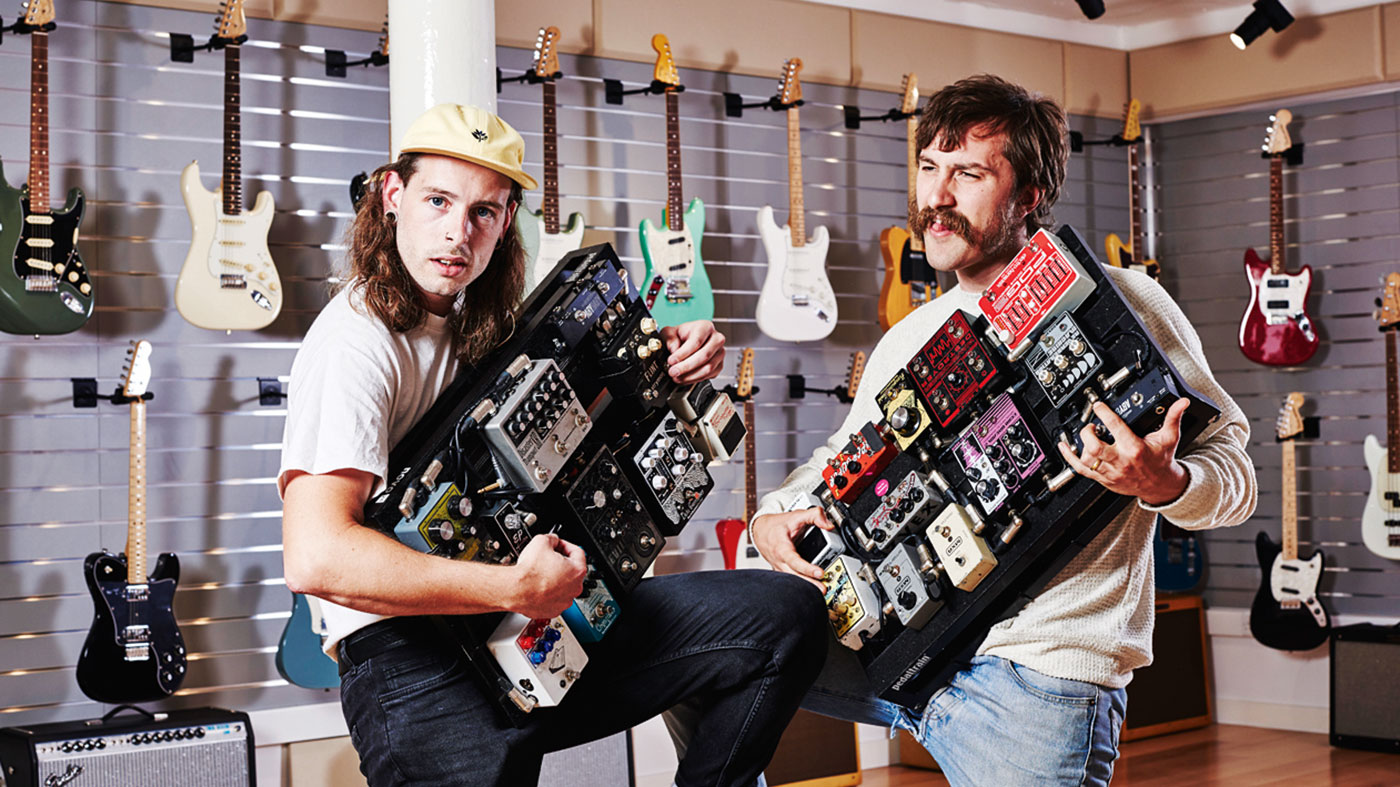
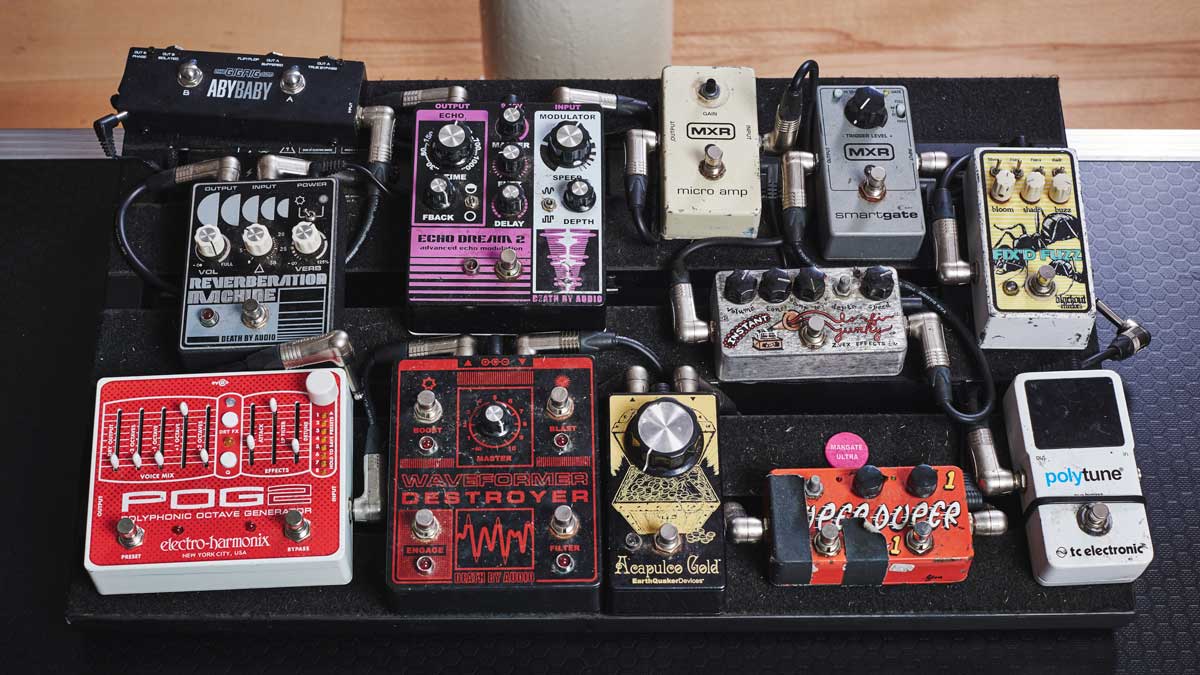
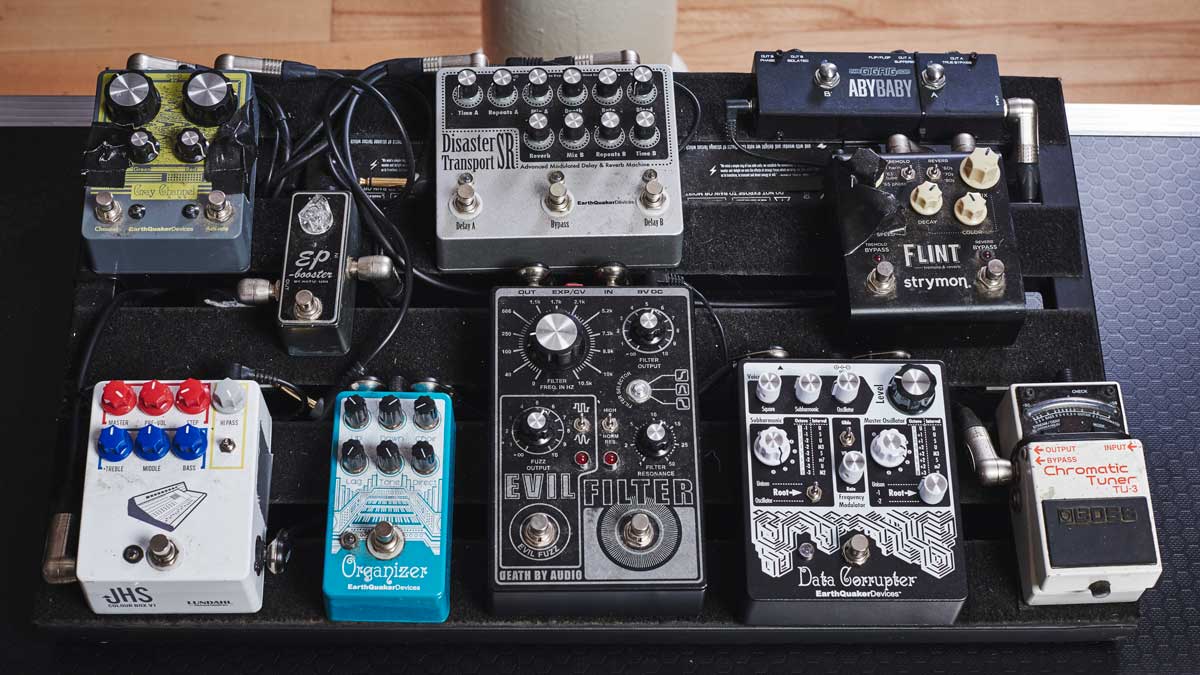
Bowen and Kiernan on their signal path essentials
They are always on and always used: there is no room for luxuries on the Idles pedalboard. Bowen looks for effects that will react to his playing. He is currently using an Electro-Harmonix POG 2, an MXR Micro Amp and Smart Gate, but it’s EarthQuaker Devices' Acapulco Gold, and Death By Audio’s Echo Dream 2, Reverberation Machine, and Waveformer Destroyer that are the most essential items in juicing up his tone.
“The best thing I find about these pedals is that they respond to what you are doing on the guitar, so if you dig in a bit more the feedback is a little bit longer,” he says. “The modulation gets a bit wilder, the fuzz gets a bit wilder, and I just love that they do that.”
Likewise, Kiernan uses Death By Audio’s Evil Filter, plus EarthQuaker Devices’ Organizer, and the Data Corruptor for some “bat-shit crazy” delay. A JHS Colour Box preamp/EQ, which emulates a vintage Neve console, is his secret weapon.
“The EQ is fucking enormous,” he says. “You turn it slightly and it’s making a difference. With most pedals you have to turn the bass all the way up for it to kick in.”
Joy As An Act Of Resistance is out now on Partisan Records.
Jonathan Horsley has been writing about guitars and guitar culture since 2005, playing them since 1990, and regularly contributes to MusicRadar, Total Guitar and Guitar World. He uses Jazz III nylon picks, 10s during the week, 9s at the weekend, and shamefully still struggles with rhythm figure one of Van Halen’s Panama.





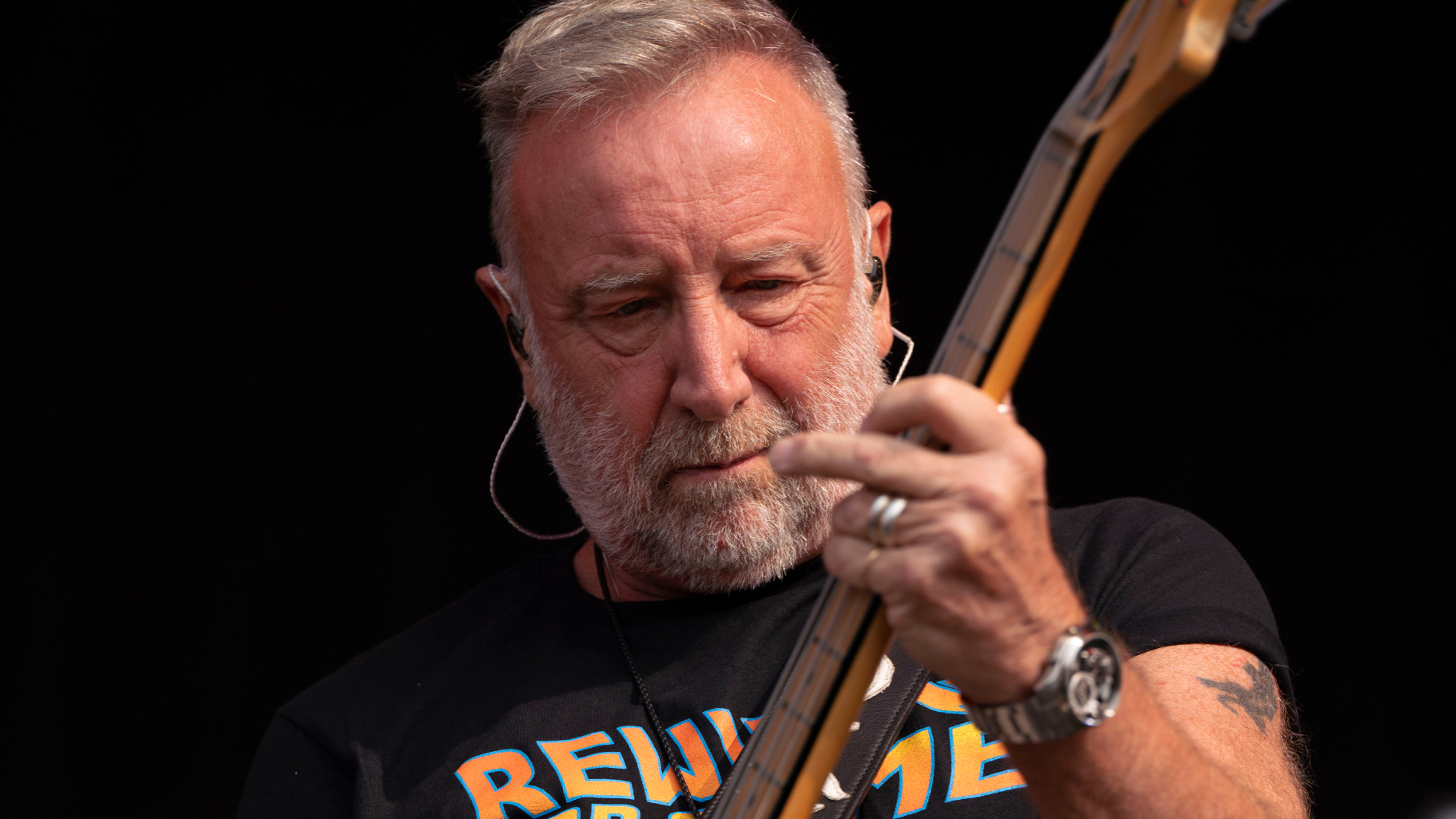
![PRS Archon Classic and Mark Tremonti MT 15 v2: the newly redesigned tube amps offer a host of new features and tones, with the Alter Bridge guitarist's new lunchbox head [right] featuring the Overdrive channel from his MT 100 head, and there's a half-power switch, too.](https://cdn.mos.cms.futurecdn.net/FD37q5pRLCQDhCpT8y94Zi.jpg)





